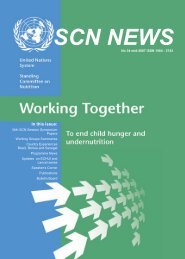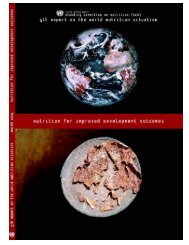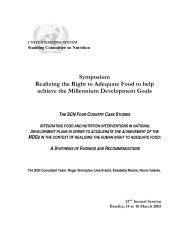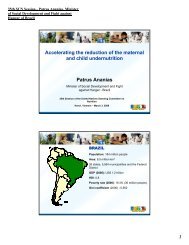60PROGRAMME NEWSwww.unsystem.org/scnThe study further suggested a step-wise reduction of the iodization standard since the retained iodine was above therecommended levels even after environmental exposure in retail and storage in bulk. The Food Nutrition and ResearchInstitute further studied the stability of iodine at the salt farm production and endorsed lowered iodine content standards(4). Recently, the country’s Bureau of Food and Drugs lowered the recommend standards of iodine levels of salt to 20-70 mg/kg across distribution channels (5). This will reduce the cost of iodization and encourage compliance amongmanufactures and traders. By Rayco-Solon P, Maramag CC, Solon JAA, Solon FS.Nutrition Center of the Philippines, Western Bicutan, Taguig City, Philippines www.ncp.org.ph(1) Department of Health. Republic Act No. 8172: An Act Promoting <strong>Salt</strong> <strong>Iodization</strong> Nationwide and for Related Purposes (ASIN Law)and its Implementing Rules and Regulations S. no. 1122 H. no. 45. Makati City: National Nutrition Council, 1996. Available online,accessed 18 December 2007. (2) Maramag CC, Tengco LW, Rayco-Solon P et al. Stability of iodine in iodized fresh and aged saltexposed in simulated market conditions. Food and Nutrition Bulletin, 2007. In press. (3) Department of Health. Revised ImplementingRules and Regulations of Republic Act No. 8172 “An Act Promoting <strong>Salt</strong> <strong>Iodization</strong> Nationwide and for Related Purposes. Availableonline, accessed 18 December 2007. (4) Saises MC, Capanzana MV, Garcia RG et al. Safety and stability of iodine in iodized salt atproduction level in selected salt farms in the Philippines. Abstract presented at the 33rd FNRI Seminar Series, 10-11 July 2007, Manila.(5) Department of Health. Bureau Circular No. 2007-009: Updated standards for iodine level of salts. Muntinlupa City: Bureau ofFood and Drugs, 2007.BrazilImpact of <strong>Salt</strong> <strong>Iodization</strong> in Brazil - Ministry of Health of BrazilIodine deficiency is a natural and permanent phenomenon widely spread throughout the world. People living in iodinedeficient areas are at risk of developing Iodine Deficiency Disorders (IDD), as mental retardation, deaf mutism, congenitalanomalies and goitre. Iodine deficiency also increases the cases of perinatal and infant mortality and risk of abortion.In Brazil, IDD was first classified as public health problem in 1950, when about 20% of population had goitre. At thesame time the Brazilian government has pursued <strong>Universal</strong> <strong>Salt</strong> <strong>Iodization</strong> (<strong>USI</strong>) in order to reduce the high prevalenceof IDD. Since then, the Ministry of Health has already conducted four surveys to evaluate the impact of this intervention,showing significant decrease in goitre prevalence (20,7% in 1955; 14,1% in 1974; 1,3% in 1984; and 1,4% in 2000).In order to sustain IDD elimination, the Brazilian government, in partnership with the salt industry, universities andNGOs, has recently reviewed the National Program of IDD Control, resulting in the publication of new technical and legaldocuments. In 2005, new legislation with the following official strategies to keep IDD elimination was published: monitoringof salt in industries; impact evaluation of salt iodization; updates on <strong>USI</strong> legislation; implementation of educationalactions and social mobilization on the importance of IDD and consumption of iodized salt.According to this legislation, Brazil must develop impact evaluation of salt iodization every three years. In 2008, Brazilwill conduct a survey to evaluate the impact of salt iodization in the entire country, involving analysis of urine and saltsamples of about 40,000 school-age children (6 to 14 years). The results are essential to evaluate if salt iodization offeredin Brazil is able to provide enough quantity of iodine to prevent and to control the IDD without risk of diseases associatedto excessive iodine consumption. Besides, the results will allow Brazil to update the international database systemsand receive the “International Certificate of Iodine Deficiency Disorders Elimination”.Contact: CGPAN, General-Coordination of the Food and Nutrition Policy, Ministry of Health of BrazilSEPN 511 C Bittar IV- 4º floor, Brasilia DF, Brazil, 70.750-543. cgpan@saude.gov.br www.saude.gov.br/nutricaoWHO/UNICEF Joint WHO/UNICEF Statement onReaching Optimal Iodine Nutrition in Pregnant and Lactating Women and Young ChildrenBased on new evidence and lessons learned within the last decade, it appears that the most susceptible groups -pregnant and lactating women, and children less than two years of age - might not be adequately covered by iodizedsalt where <strong>Universal</strong> <strong>Salt</strong> <strong>Iodization</strong> is not fully implemented. This situation may jeopardize the optimal braindevelopment of the fetus and young child. In order to address this issue, WHO convened a technical consultation on theprevention and control of iodine deficiency in pregnant and lactating women and in children less than two years of age.The consultation, held on 24-26 January 2005 in Geneva, Switzerland, made recommendations to ensure optimumiodine nutrition among these groups (1). As a follow-up to the meeting, and in order to provide programmatic guidance toimplement these recommendations within the country programme planning process, WHO and UNICEF held a jointmeeting on 15-16 November 2005 at UNICEF Headquarters, New York, USA.The statement is available online from www.who.int/nutrition1. WHO. Prevention and control of iodine deficiency in pregnant and lactating women and in children less than two years old. WorldHealth Organization. Geneva (In Press).SCN NEWS # 35 back to contents
www.unsystem.org/scn PROGRAMME NEWS 61New WHO Growth Reference data for children and adolescents 5-19 yearsWHO has recently published growth reference data for children and adolescents, 5-19 years (or 61-228 months). TheWHO Reference 2007 is a reconstruction of the 1977 National Center for Health Statistics (NCHS)/WHO reference. Ituses the original NCHS data set supplemented with data from the WHO child growth standards sample for under-fives.The same statistical methodology was used as in the construction of the WHO standards. This reference complementsthe WHO child growth standards for 0-60 months published in April 2006. www.who.int/growthrefReference charts and tables by indicator:WHOBMI-for-age (5-19 years) (online); Height-for-age (5-19 years) (online); Weight-for-age (5-10 years) (online)HIV and Nutrition ConsultationWHOCountries from the South-East Asian Region, together with scientists, researchers programmers, decision makers, UNagencies, civil society groups, organizations of people living with HIV/AIDS, donors and bi-laterals, gathered inBangkok, 8-11 October 2007, to find workable strategies for incorporating nutrition into national HIV prevention, careand treatment programmes in the South-East Asian Region. They reviewed the evidence, identified challenges,listened to experiences from the field and defined clear-cut next steps for change.This Regional Consultation on Nutrition and HIV: Evidence, Lessons and Recommendations for Action in South-EastAsia, was organized by the World Health Organization, in collaboration with UNICEF, WFP, FAO, UNAIDS, UNHCR,IAEA and the US National Institutes of Health, in direct response to its commitment to the World Health Assemblyresolutions 59.11 and 57.14 where Member States are requested to make Nutrition an integral part of their responseto the HIV/AIDS. This Consultation built on the experience of the Durban Consultation in 2005 for Southern Africa.The South East Asian Region is home to nearly 4 million of the approximately 40 million people living with HIV/AIDSworldwide in 2006. At the same time, 79% of the world's malnourished children come from this Region and severalcountries report over 40% stunting, indicating persistent chronic malnutrition. This Region, with its large and rapidlygrowing populations, widespread malnutrition and burden of infectious and chronic disease, is particularly vulnerableto the HIV epidemic. In response to these issues the Participants agreed that:1. Stronger advocacy and visibility was needed at the global and country level for incorporating nutrition into HIV/AIDSprogrammes.2 Region specific data on the nutritional status of PLWHA should be developed by countries which should serve as anadvocacy tool for policy.3. International agencies should allocate part of the budget (a 5% figure was suggested) for nutrition support and carefor HIV in countries. Resources should be allocated to fill the gaps.4. A coordinated plan of action for nutrition and HIV should be developed by countries avoiding duplication of efforts.The full range of interventions should be used to meet the macro and micronutrient requirements including nutritioncounselling.5. Countries should develop monitoring and evaluation mechanisms.6. A Participants’ Statement emerged from the participants which outlined the key recommendations and actions for allstakeholders to take responsibility for and act effectively and urgently to meet the collective goals.For more information, please contact Randa Saadeh, Scientist, Dept of Nutrition for Health and Development,saadehr@who.int, or Sharad Agarwal Communications Officer, Dept of Nutrition for Health and Development,agarwals@who.int or visit the HIV and Nutrition Consultation websiteWHO Scientific Update on Trans Fatty Acids (TFA) WHOWHO undertook a Scientific Update on Trans Fatty Acids (TFA) as part of the implementation of the Global Strategy onDiet, Physical Activity and Health. The Scientific Update reviewed the health effects of TFA from both epidemiologicaland experimental perspectives, as well as the feasibility of alternative replacements. The expert group met in Genevafrom 29 to 30 October 2007 and reviewed scientific background papers prepared and further agreed to prepare six scientificreview papers. These include: 1) General historical background of the work related to TFA and the Global Strategy;2) Health effects of TFA: Experimental and observational evidence: 3) Quantitative effects on cardiovascular riskfactors and coronary heart disease risk of replacing partially hydrogenated vegetable oils with other fats and oils; 4) Feasibilityof recommending certain replacement or alternative fats; 5) Assessing approaches to removing TFA in the foodsupply in industrialized countries and in developing countries; and 6) Summary and conclusions of the Scientific Update.Final papers will be published as a supplement of the European Journal of Clinical Nutrition by end-January 2008.back to contents SCN NEWS # 35







